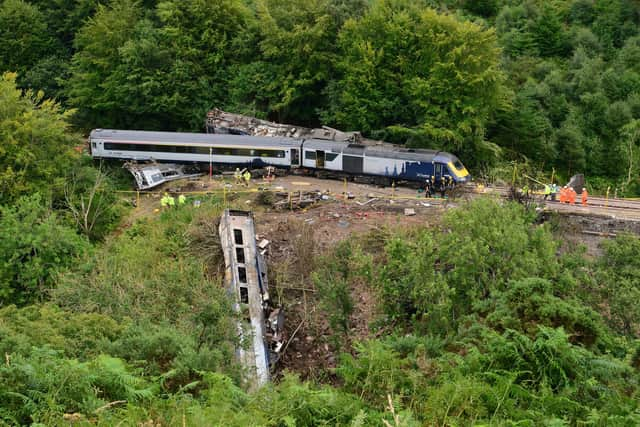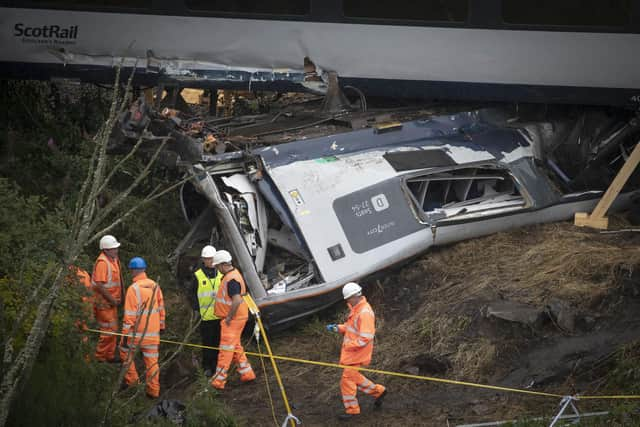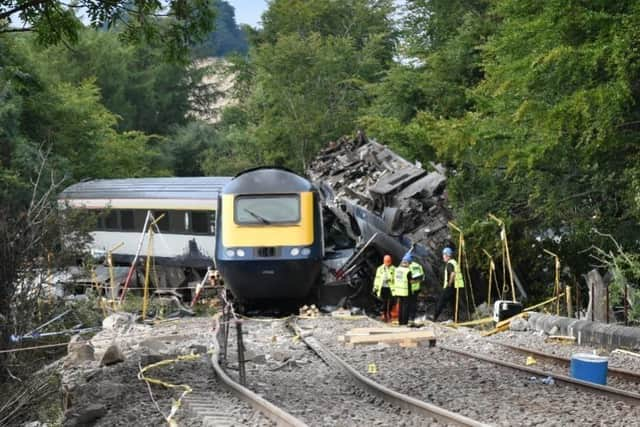Stonehaven crash: Network Rail pleads guilty to charges over fatal Scotland train derailment
Network Rail has pleaded guilty to health and safety failings over a train crash that claimed three lives.
Train driver Brett McCullough, 45, conductor Donald Dinnie, 58, and passenger Christopher Stuchbury, 62, died in the derailment near Stonehaven, Aberdeenshire, on August 12, 2020.
Advertisement
Hide AdAdvertisement
Hide AdAt the High Court in Aberdeen on Thursday, the company admitted a charge covering the period from May 1, 2011 to August 12, 2020.


It admitted it failed to ensure, so far as was reasonably practical, that railway workers not in its employment and members of the public travelling by train were not exposed to the “risk of serious injury and death from train derailment” as a result of failures in the construction, inspection and maintenance of drainage assets and in adverse and extreme weather planning.
The charge states that in particular, Network Rail failed to ensure, so far as was reasonably practicable, that a drainage asset located off-track of the Dundee to Aberdeen railway line near Stonehaven, constructed by Carillion between May 1, 2011 and December 31, 2012, was “constructed properly” and in accordance with the design drawings.
The charge also says Network Rail failed to conduct a handover meeting with the contractors to check the drainage asset had been properly constructed and built in accordance with the design.
Network Rail also admitted it did not have an adequate system of training and quality assurance in place in relation to the analysis of weather forecasts, which resulted in no emergency extreme weather action teleconference being held on the morning of August 12.


Court documents outline how there was a forecast of “extreme rainfall” and reports of severe weather, landslips and flooding in Aberdeenshire and the surrounding area on the day of the crash.
The charge states Network Rail failed to impose an emergency speed restriction “in absence of current information about the integrity of the railway line and drainage assets between Montrose and Stonehaven”, and failed to inform the driver that it was unsafe to drive the train at a speed of 75mph or caution him to reduce his speed.
The charge outlines how the drainage asset, which had not been properly constructed failed, gravel was washed out from the drainage trench and on to the railway track, which the train struck, causing it to derail, decouple and strike a bridge parapet.
Advertisement
Hide AdAdvertisement
Hide AdAs well as the three deaths, a further six people were injured in the crash.


Network Rail admitted breaching two sections of the Health and Safety at Work Act 1974.
The ScotRail train derailed at 9:37am after it struck a landslide, hitting gravel and other stony material washed out from a drain. The train hit the side of a bridge, causing its power car and one of its four carriages to fall down an embankment.
The case is listed on the Scottish Courts and Tribunals Service court rolls as a Section 76 indictment, a procedure that suggests a guilty plea may be offered.
A Rail Accident Investigation Branch (RAIB) report published in March last year found errors in the construction of a drainage system installed by Carillion meant it was unable to cope with heavy rain which fell in the area on the morning of the crash.
Carillion went into compulsory liquidation in January 2018.
The RAIB report made 20 recommendations to improve railway safety, many of which were directed at Network Rail.